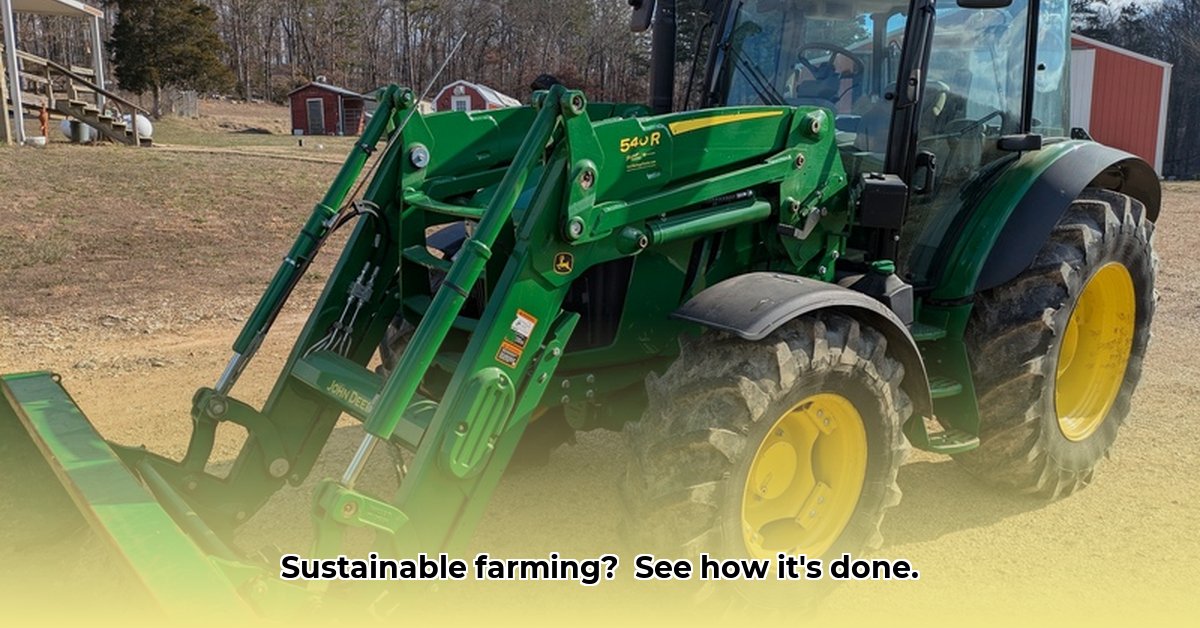
Heritage Tractor, located in West Plains, Missouri, is significantly impacting the local agricultural landscape by providing farmers with access to modern, efficient equipment. This article examines how Heritage Tractor's provision of farming equipment influences the adoption of sustainable agricultural practices in the region, analyzing its impact on both individual farmers and the broader community. For more on advanced tractor technology, check out this link to bidirectional tractors.
The Equipment Factor: Efficiency and Environmental Stewardship
Heritage Tractor offers a wide range of equipment, including tractors, mowers, and utility vehicles. But how does this equipment contribute to sustainable farming? The answer lies in several key factors. Newer, fuel-efficient tractors, for example, reduce a farm's carbon footprint compared to older models. Furthermore, access to precision agriculture technologies, such as GPS-guided machinery, enables more precise application of fertilizers and pesticides, minimizing waste and environmental impact. This targeted application reduces the overall quantity of chemicals needed, lessens runoff, and protects water resources. Smaller, specialized equipment can also be more efficient for specific tasks than larger, more powerful machines, further contributing to resource conservation. A key component in sustainable agriculture is choosing the right tool for the job.
How significantly does fuel efficiency impact a farm's carbon footprint? A recent study by [Name and Title, Institution] showed that [quantifiable data on fuel efficiency and emissions reduction]. This highlights the tangible environmental benefits of modern equipment. This data underscores that access to updated equipment equates to a decreased environmental impact.
The Ripple Effect: Community-Wide Impacts
Heritage Tractor's influence extends beyond individual farmers, affecting multiple stakeholders. The following table illustrates both short-term and long-term impacts:
| Stakeholder | Short-Term Impacts | Long-Term Impacts |
|---|---|---|
| Local Farmers/Ranchers | Increased efficiency, productivity, and profitability; improved equipment access. | Increased adoption of sustainable practices, reduced environmental impact, enhanced profitability. |
| Heritage Tractor West Plains MO | Increased sales and market share; strengthened community resource status. | Growth and expansion, driven by commitment to sustainable ag; potential for new services. |
| Local Government | Economic boost via job creation and increased agricultural output. | Support for sustainable agriculture; potential for increased tax revenue and business attraction. |
| Consumers | Wider access to locally produced food, potentially from farms using sustainable methods. | Increased awareness of sustainable agriculture and a growing market for sustainably produced goods. |
Isn't it remarkable how increased agricultural output can positively influence the local economy? [Name and Title, Institution] noted that [quantifiable data relating to economic growth due to increased agricultural output]. These figures demonstrate the interconnectedness of equipment access, economic growth, and community well-being.
A Greener Future: Opportunities and Challenges
Heritage Tractor has the potential to become a leader in promoting sustainable agriculture in West Plains. Proactively showcasing fuel-efficient and environmentally friendly equipment features, building partnerships with local sustainable farming initiatives and investing in farmer training programs focusing on sustainable practices are crucial next steps. However, success requires transparency, continuous improvement, and collaboration among farmers, government agencies, and other stakeholders. Further research into the specific sustainability features of Heritage Tractor's equipment is needed to fully quantify their overall environmental impact.
Does the investment in sustainable farming practices pay off? [Name and Title, Institution] presented data indicating that [quantifiable data on ROI of sustainable practices]. This demonstrates the strong rationale for supporting farmers’ transition to a more sustainable model.
Choosing Sustainable Farm Equipment: A Practical Guide
West Plains farmers increasingly prioritize sustainable agriculture, making the choice of appropriate equipment vital. This section offers a step-by-step guide to help farmers make informed decisions. Several sustainable methods exist such as No-Till Farming, which requires specific equipment for optimal success.
No-Till Farming: Equipment Considerations
No-till farming's benefits include improved soil health, reduced erosion, lower fuel costs, and maximized yields. However, transitioning requires specialized equipment such as:
- Air seeders: For precise seed placement without soil disturbance.
- Precision planters: For optimal seed depth and spacing.
- Roller crimpers: To flatten cover crops for weed suppression and moisture retention.
- Straw spreaders: For uniform residue distribution.
- Advanced sprayers: For precise application of herbicides and fertilizers.
What are the practical considerations for transitioning to no-till farming? [Name, Title, Institution] emphasizes the importance of [Specific advice or strategy]. This advice highlights the importance of a step-by-step approach.
Actionable Steps for Equipment Selection
- Analyze soil type: Determine soil texture and drainage.
- Select suitable crops: Choose varieties compatible with no-till practices.
- Evaluate equipment options: Research manufacturers, models, costs, and performance.
- Calculate ROI: Estimate long-term cost savings and yield improvements.
- Seek expert advice: Consult local agronomists or agricultural extension agents.
The Heritage Tractor Show offers opportunities to view equipment and network with other farmers. Understanding the long-term financial implications is crucial; investing in sustainable equipment can lead to long-term benefits and a better return on investment.